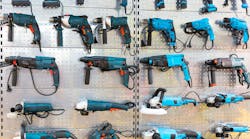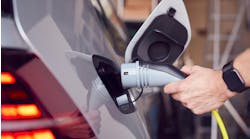As an electrical contractor, your power tools are your livelihood. Without them, your work would be impossible. However, there’s one important component of your power tools that you might not be paying enough attention to: the batteries. There are three crucial things you must know about your power tool batteries.
1. Using counterfeit batteries is dangerous.
Not only do counterfeits and knockoffs have a shorter lifespan and poorer performance than original equipment manufacturer (OEM) batteries, but they also pose a risk of explosion or fire. You should always purchase OEM batteries from a reputable source, and avoid cheap imitations that could put your safety at risk.
Why buy OEM? Because the consequences of doing otherwise can be very dangerous. An OEM battery is designed for seamless compatibility with your power tool/charger and has undergone rigorous testing to back it up.
Even if you find a battery online that says it works with your power tool model, use extreme caution when considering the purchase. The retail space is where an abundance of counterfeit and knock-off power tool batteries are sold. Scammers leverage vulnerabilities in the global supply chain (as well as tradespeople’s continuing need for new batteries) to sell a wide variety of counterfeits or unauthorized replicas. It’s gotten so bad, even the FBI issued a warning about these scams.
While the exterior appearance of a counterfeit or knockoff may seem well-made and reassuring, what matters is what’s on the inside. Each OEM has its proprietary control circuitry that is not available to third-party component suppliers. No knock-off battery can match the OEM. What seems to work well out of the box may deliver dire consequences later.
You also don’t want to buy on price alone. Purchasing a battery from an unknown seller without having any verification of the seller’s qualifications or experience (or of the battery’s construction, testing, or certification) can leave you with an unsatisfying — and potentially dangerous — experience. Pay close attention to the packaging so you don’t accidentally pick up a knock-off battery (makers of these knockoffs sometimes use colors and typefaces similar to those of the recognized brands specifically to confuse buyers). Purchase batteries from authorized dealers, and be suspicious of any price that seems too good to be true. It probably is.
2. It’s important to handle your batteries safely during storage and transportation.
Lithium-ion batteries are particularly sensitive to heat and cold, so you should avoid leaving them in direct sunlight or freezing temperatures. Furthermore, you should never carry loose batteries in your pocket or bag, as they could come in contact with metal objects and short-circuit.
Start by reading the manufacturer’s instruction manual for proper care and storage of the battery. Do not strike or damage a battery (e.g., do not use it as a hammer; use it solely for the defined purpose as specified by the manufacturer). If a battery has received a sharp blow, been dropped, or is damaged, discontinue use.
Regularly inspect batteries for signs of damage, such as crushing, cuts, or punctures. Be mindful of abnormal battery behavior, such as failure to fully charge or hold a charge, longer-than-usual charging times, a noticeable drop in performance, liquid leakage from the battery, or melted plastic anywhere on the pack. These are indications of an internal problem.
Never modify, disassemble, or tamper with the battery because the performance can become unpredictable and dangerous. As a general practice, it is best to unplug battery chargers and remove battery packs from them when not in use.
3. It’s crucial to recycle your power tool batteries properly.
These batteries contain hazardous chemicals that can harm the environment if not disposed of correctly. Many hardware stores and battery manufacturers offer recycling programs, so make sure you take advantage of them rather than throwing your batteries in the trash.
Lithium-ion batteries have revolutionized power tools and other devices, providing long-lasting, reliable power that has higher energy density, charges quickly, and holds its charge longer. But, like all batteries, even lithium-ion batteries reach the end of their service life eventually.
When this happens, the first impulse might be to toss it in the trash — but don’t! These batteries must be disposed of properly by a qualified recycler.
Why not put them in the trash? Improperly disposing of the battery could subject them to corrosion, punctures, crushing, or other damage during the transport and processing of household trash. This could lead to a battery fire — one that is difficult by its nature to extinguish.
Federal law even requires lithium-ion batteries (and others) to be recycled, not thrown away. A violation carries heavy fines. In addition, 29 states have their own battery recycling laws. To see how your state handles battery disposal, visit https://www.call2recycle.org/recycling-laws-by-state/. Keep in mind that states without their own laws are still governed by the federal recycling law.
Recycling your lithium-ion battery isn’t as hard as you might think. Most big-box hardware retailers have recycling bins specially designated for lithium-ion batteries; do not place batteries in a recycling bin not designated for lithium-ion batteries. The bins are often positioned right by the entrance for maximum convenience. Simply place the battery in the bin, and the recycler does the rest.
For other recycling options, call your local solid waste district to find out if your community has a collection program.
In conclusion, taking care of your power tool batteries is just as important as using the right tools for the job. By following these three tips, you can ensure your batteries are safe, reliable, and long-lasting, which will help you work more efficiently and effectively.



